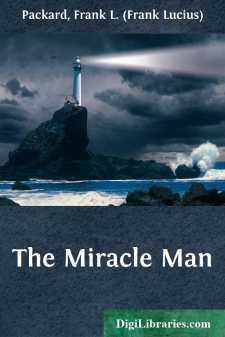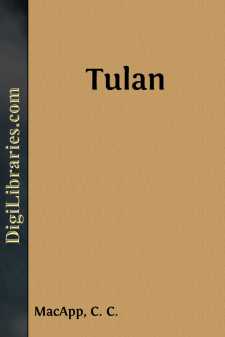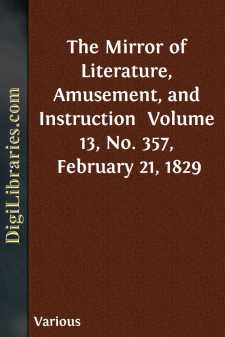Categories
- Antiques & Collectibles 13
- Architecture 36
- Art 48
- Bibles 22
- Biography & Autobiography 813
- Body, Mind & Spirit 142
- Business & Economics 28
- Children's Books 17
- Children's Fiction 14
- Computers 4
- Cooking 94
- Crafts & Hobbies 4
- Drama 346
- Education 46
- Family & Relationships 57
- Fiction 11829
- Games 19
- Gardening 17
- Health & Fitness 34
- History 1377
- House & Home 1
- Humor 147
- Juvenile Fiction 1873
- Juvenile Nonfiction 202
- Language Arts & Disciplines 88
- Law 16
- Literary Collections 686
- Literary Criticism 179
- Mathematics 13
- Medical 41
- Music 40
- Nature 179
- Non-Classifiable 1768
- Performing Arts 7
- Periodicals 1453
- Philosophy 64
- Photography 2
- Poetry 896
- Political Science 203
- Psychology 42
- Reference 154
- Religion 513
- Science 126
- Self-Help 84
- Social Science 81
- Sports & Recreation 34
- Study Aids 3
- Technology & Engineering 59
- Transportation 23
- Travel 463
- True Crime 29
Sort by:
by:
Anonymous
When it was the Five Hundred and Seventy-second Night, She said, It hath reached me, O auspicious King, that when the Jinni who was prisoned in the pillar had told them his tale, from first to last, the folk marvelled at his story and at the frightfulness of his favour, and the Emir Musa said, "There is no God but the God! Soothly was Solomon gifted with a mighty dominion." Then said the Shaykh...
more...
by:
Anonymous
THE MAN IN THE MOONThe Man in the MoonCame tumbling down,And asked his way to Norwich; They told him south,And he burnt his mouthWith eating cold pease-porridge.TO MARKET, TO MARKETTo market, to market, to buy a fat Pig; Home again, home again, dancing a jig. To market, to market, to buy a fat Hog; Home again, home again, jiggety-jog.THERE WAS A MANThere was a man, and he had nought, And robbers came...
more...
by:
Eberhard Dennert
PREFACE. The general tendency of recent scientific literature dealing with the problem of organic evolution may fairly be characterized as distinctly and prevailingly unfavorable to the Darwinian theory of Natural Selection. In the series of chapters herewith offered for the first time to English readers, Dr. Dennert has brought together testimonies which leave no room for doubt about the decadence of...
more...
THE MIRACLE MAN THE "ROOST" He was a misshapen thing, bulking a black blotch in the night at the entrance of the dark alleyway—like some lurking creature in its lair. He neither stood, nor kneeled, nor sat—no single word would describe his posture—he combined all three in a sort of repulsive, formless heap. The Flopper moved. He came out from the alleyway onto the pavement, into the lurid...
more...
by:
Various
ACT I. A Room tastefully filled with cheap Art-furniture. Gimcracks in an étagère; a festoon of chenille monkeys hanging from the gaselier. Japanese fans, skeletons, cotton-wool spiders, frogs, and lizards, scattered everywhere about. Drain-pipes with tall dyed grasses. A porcelain stove decorated with transferable pictures. Showily-bound books in book-case. Window. The Visitors' bell rings in...
more...
by:
C. C. MacApp
To disobey the orders of theCouncil of Four was unthinkableto a Space Admiral of the oldschool. But the trouble was,the school system had changed.A man, a fighter, an Admiralhad to think for himself now, ifhis people were to live. While facing the Council of Four his restraint had not slipped; but afterward, shaking with fury, the Admiral of the Fleets of Sennech slammed halfway down the long flight of...
more...
by:
Jean de Esque
PREFACE To the readers of this poem an apology is needed for affixing thereto a praem. Some friends of mine have been plaguing me beyond the restrictive line of Patience for the true cause of conceiving the accompanying collection of words, balderdash or what you will, some even asseverating with the eruditeness of an Aristole that it was a nebulous idea, an embryonic form of thought hibernating within...
more...
by:
J. A. Taylor
Someone must have talked over the fence because the newshounds were clamoring on the trail within an hour after it happened. The harassed Controller had lived in an aura of “Restricteds,” “Classifieds” and “Top Secrets” for so long it had become a mental conditioning and automatically hedged over information that had been public property for years via the popular technical mags; but in time...
more...
by:
Various
WARWICK CASTLE. The history of a fabric, so intimately connected with some of the most important events recorded in the chronicles of our country, as that of Warwick Castle, cannot fail to be alike interesting to the antiquary, the historian, and the man of letters. This noble edifice is also rendered the more attractive, as being one of the very few that have escaped the ravages of war, or have defied...
more...
by:
Jennette Lee
I "Yes, I'm shif'less. I'm gen'ally considered shif'less," said William Benslow. He spoke in a tone of satisfaction, and hitched his trousers skilfully into place by their one suspender. His companion shifted his easel a little, squinting across the harbor at the changing light. There was a mysterious green in the water that he failed to find in his color-box. William...
more...











